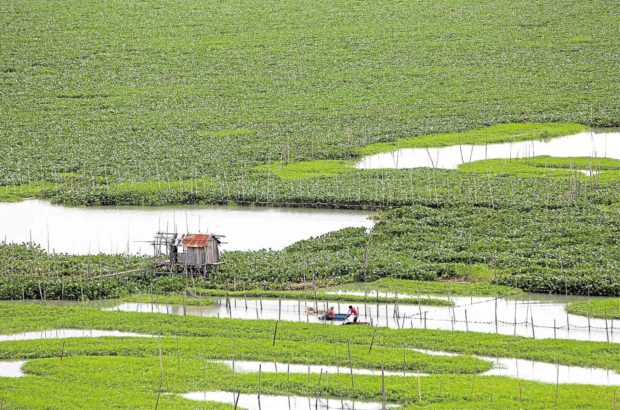
A section of Laguna de Bay in the village of Looc in Cardona town, Rizal province, is covered by a thick bed of water hyacinths, isolating lakeshore communities there. —LYN RILLON
Thick beds of water hyacinth in Laguna de Bay have prompted the local government of Cardona in Rizal province to declare the town under a state of calamity.
Swaths of the aquatic plant, stretching to about 2 kilometers from the shoreline, have virtually isolated communities in the town’s 14 villages, including those on Talim Island, according to Erwin Dionisio, municipal disaster risk reduction and management officer.
“Fishermen could not sail out in the lake because of the water hyacinth blocking the waterway. Our fishing ports are also closed,” he said.
The affected villages are Balibago, Tuna, Lambac, Boor, Malangam/Calibacan, Subay, Navotas, Ticulio, Nagsulo and Sampad, all on Talim island. Also affected were the villages of Looc, Dalig, Patunhay and Calahan in mainland Cardona.
“Travel by boat from mainland to Talim usually takes about 30 minutes to one and a half hours. But right now, you’d probably have to spend the entire day travelling (just to reach Talim),” he said.
Small passenger boats ferrying residents in and out of Talim have to take the longer route via Binangonan town.
Cardona residents first observed the surge of water hyacinths about two weeks ago. Normally, Dionisio said the onset of “amihan” (northeast monsoon) during this time of the year would drive water hyacinths toward their town, “but never this much.”
“It’s the first time and we’re really surprised,” he said in a telephone interview.
Calamity fund
Last week, the local government declared Cardona under a state of calamity, allowing the release of P4 million to remove the water hyacinths and lessen the impact on residents’ livelihood.
Dionisio said more than 8,000 local fishermen had been affected by the water hyacinth clogging, many of them had stopped fishing.
“There are insects thriving on the water hyacinths and residents are already suffering from mosquito and gnat bites,” he added.
Last week, the local government started spraying the water hyacinths with a weed killer.
“Our municipal agriculturist said the chemical is safe for fish [in the lake],” Dionisio said.
Laguna de Bay mainly supplies “bangus” (milkfish) and tilapia to markets in Luzon and parts of the Visayas. The lakeshore town of Cardona depends highly on the fishing industry.
Cardona officials have met with representatives of the Laguna Lake Development Authority and other national government agencies to address the situation.
They will begin distributing relief packages to affected communities by next week and employing residents for a cash- or food-for-work program to clear the waterways.
“We’re just worried that if this is not addressed soon, (water hyacinth covering the surface water) might lead to a fish kill due to lack of oxygen (in the water),” Dionisio added.